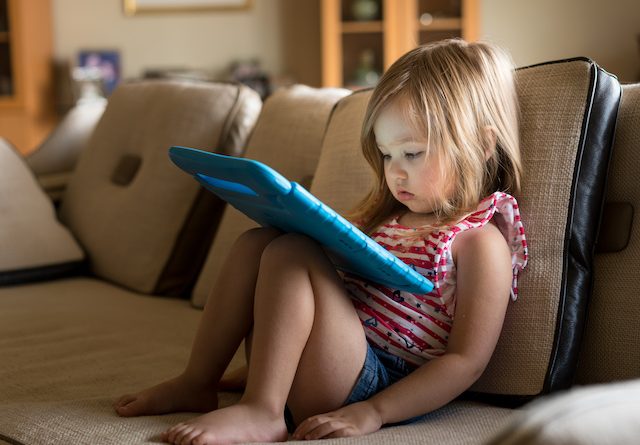Missing the Point – Screen time is adversely affecting child development
When I was growing up, the rule was that I couldn’t watch TV until I’d done my homework.
We had one TV in our house – and there was nothing flat about it. I had a little red, six transistor Motorola radio – transistors shaped like little cans, so big you could see them when you took off the back to change the battery. It may have been the beginning of rock and roll, but “consumer electronics” wouldn’t become a major sector in our economy until years later. It would be a while, decades in fact, before the invention and proliferation of smartphones, personal computers, and pads would change everything, mostly, but not entirely for the better.
Two generations later, in the age of my grandchildren, “screen time” has become an issue. In case you’ve been living under a rock, I’m talking about the amount of time a person spends on a given day watching some kind of screen, be it a smartphone, computer, pad, or television, although it turns out that TV may be the least problematic of these devices.
Suffice it to say, this isn’t about a couple of minutes here and there spent talking to your “Aunt Panda” – That’s what one of our granddaughters calls her. – on a FaceTime call. We’re talking about the hours every day that even preschool kids, but especially older ones are staring at screens according to various studies.
What is it that we have to worry about? When we’re born, our brains have a long way to go before they are fully developed. We have no experience, no knowledge, and relatively few instinctive behaviorisms that prepare us for the transition on our way to being fully functional members of our species. When you’re born, everything that happens next in the first years of life will determine pretty much all that you will become.
Through sight, sound, touch, and interaction with other humans, the miracle coding of the human brain will take it all in and make sense of it. Physically, intellectually, emotionally, and socially, our mind is figuring it out – not just remembering, but programming itself based on what we experience. Even the size and structure of our brain will be profoundly affected by interaction with other people, principally by our parents at first, but others as well, more and more so as we get older.
When we have children, our job – individually and as a collective society – is just beginning. The quality of our lives and nothing less than the long-term survival of humanity will be determined by how effectively we finish the development of these new humans who will be our successors.
It used to be, before the current era of our modern technologies, that raising children was a more or less natural process. Not anymore.
Everything we see, hear and touch helps form the physical brain structure, specific knowledge, and intelligence that will define us. Anything that distracts us from this apprenticeship of humanity has the potential to adversely affect the pace and quality of development. “Screens” are the distraction that many, many educators and other scientists are finding detrimental to our physical and mental health, our intellectual abilities, and how we relate to one another.
Unfortunately, the neural programming that evolved over hundreds of thousands of years requires a particular type and quality of care and experience once a person is born to complete itself. Our brains are not prepared for the onslaught of alternative stimuli that we have created, just recently, in a relative flash. We can’t possibly evolve fast enough to keep up. The question is whether our technology is supportive of or detrimental to our species that created it? Could it be that we have outsmarted ourselves and are entering a critical phase of our existence in which we are too slow to even recognize, let alone deal with serious, existential problems?
Did you know, for example, that little kids can’t learn, can’t fully appreciate how to play with blocks – nor will their minds realize the various implications of the process – by watching other kids do it on TV? Television isn’t just visually two-dimensional. It lacks the intellectual texture of real life and fails as a tool for encouraging the development of the human brain. Watching TV isn’t the same as experiencing live play with actual blocks and the participation of parents and siblings.
I know, it’s a trivial little kid observation that I just made, but true for adults as well. Do you want a doctor operating on you whose only experience as a surgeon was by watching a YouTube video? Of course not.
The far more important question is whether you want your children to learn about interpersonal interactions or how to think by staring at a screen instead of into the faces of real people communicating and behaving in front of them in person.
Today, as an adult, I occasionally watch YouTube videos to learn how to fix something. When I was a little kid, I learned how to build things – including all the more subtle aspects of the process – working with my father in his shop. I can still see the perspiration on his arms, but didn’t realize until later how many lessons he was teaching me. Same for my mother who took me everywhere she went, talking to me constantly, explaining everything we were doing together. No one ever turned me on to the intoxication of digital media. There wasn’t any. No teacher ever sent me home with work to do online.
So, is the discussion of screen time about form or substance? What difference does it make if I read a book printed on a product made from trees or an eBook? That’s about form. We drive cars today because it’s better than going places in horse-drawn carriages. On the other hand, is texting your friends better than talking to them in person? Or is the absence of interpersonal chemistry telling you less than you need to know about the other person and the essential process of communication?
Am I telling you how to raise your children? Of course not. Am I, as a parent and grandparent, and citizen, concerned about the negative effects on our children resulting from the overuse of digital media in their upbringing? Absolutely.
And don’t think for a minute that too much screen time is only a problem for children?
What the heck, I’m writing this piece on my computer, from which I’ve hardly looked up in the past hour except to catch a work-related CNN story playing on the flatscreen hanging off the corner wall of my office. And now you’re racking up screen time reading it, but the alternative is the paper version, if there was one. Once again, that’s more about form than substance. It’s not as if reading this is taking away from personal, face-to-face social interaction with your fellow humans to any meaningful extent.
As for replacing direct personal communications with social media, that’s a different story. Working at home, relating to your coworkers over the phone or even on Zoom isn’t the same as being there. It just isn’t. It may be convenient, but you know it’s not the same work experience. Intellectually, creatively, and socially, the chemistry of human interaction that is the secret to our success doesn’t happen online.
Nor is it a good thing so many of us are allowing screen time to affect the quality and extent of the sleep we should be getting, but aren’t.
Our problem is how we allocate our time. As parents, it may be convenient and otherwise well-intentioned to let our toddler or older preschooler use a pad or watch television, but is it the best use of a developing child’s time? And, if not, with what short- and long-term consequences for the process of development? With what implications for the final result? The changes – to the physical structure of developing brains, to intelligence, to intellectual processing, and to social behavior are neither trivial nor are they necessarily reversible as we evolve into adults.
It may be en vogue to have middle and high school students work on computers in school and when they do homework at home, but is it a good idea?
Simply put, we have allowed ourselves to be seduced by visual technology that is evolving at a pace that exceeds our natural abilities to adapt, with consequences we just beginning to realize.
What’s my research behind all this? This is an op/ed. I’m not a reporter. This is not an academic article. I’m not going to replay enumerable quotes from articles and credible studies describing the specific impact of screen time on children of all ages. Do your research. What you’ll find is troubling material that I assume our educators have read and thought about carefully. But maybe not.
Unfortunately, I see contradictory behavior from our school systems, and mixed signals emanating from the professionals to which we entrust the education of our children. On one hand, teachers and other educators seem in complete agreement that too much screen time is a bad thing and all too common. But then, at the same time, students at all levels of public education are given devices – laptops in fact when they’re in middle and high school – to use during class and at home. I think these educators are missing the point.
Public education needs to make up its mind. All else equal, is the quality of public education today better as a result of the current emphasis on the use of digital devices? With what implications for the more extensive involvement of our children with social media at the expense of personal interaction? We need to figure out what we’re doing before it’s too late to fix it.
What am I proposing? Admittedly, it’s going to sound a tad radical. Simply put, we need to discontinue the extensive and intensive use of screens in our schools until we fully understand – through carefully designed studies – the full implications of what we’re doing for child development and behavior. The FDA doesn’t let medicines on the market until they’ve been thoroughly tested. Screen time should be managed in the same way by the authorities in charge of K through 12 public education.

Les Cohen is a long-term Marylander, having grown up in Annapolis. Professionally, he writes and edits materials for business and political clients from his base of operations in Columbia, Maryland. He has a Ph.D. in Urban and Regional Economics. Leave a comment or feel free to send him an email to [email protected].

